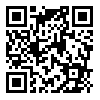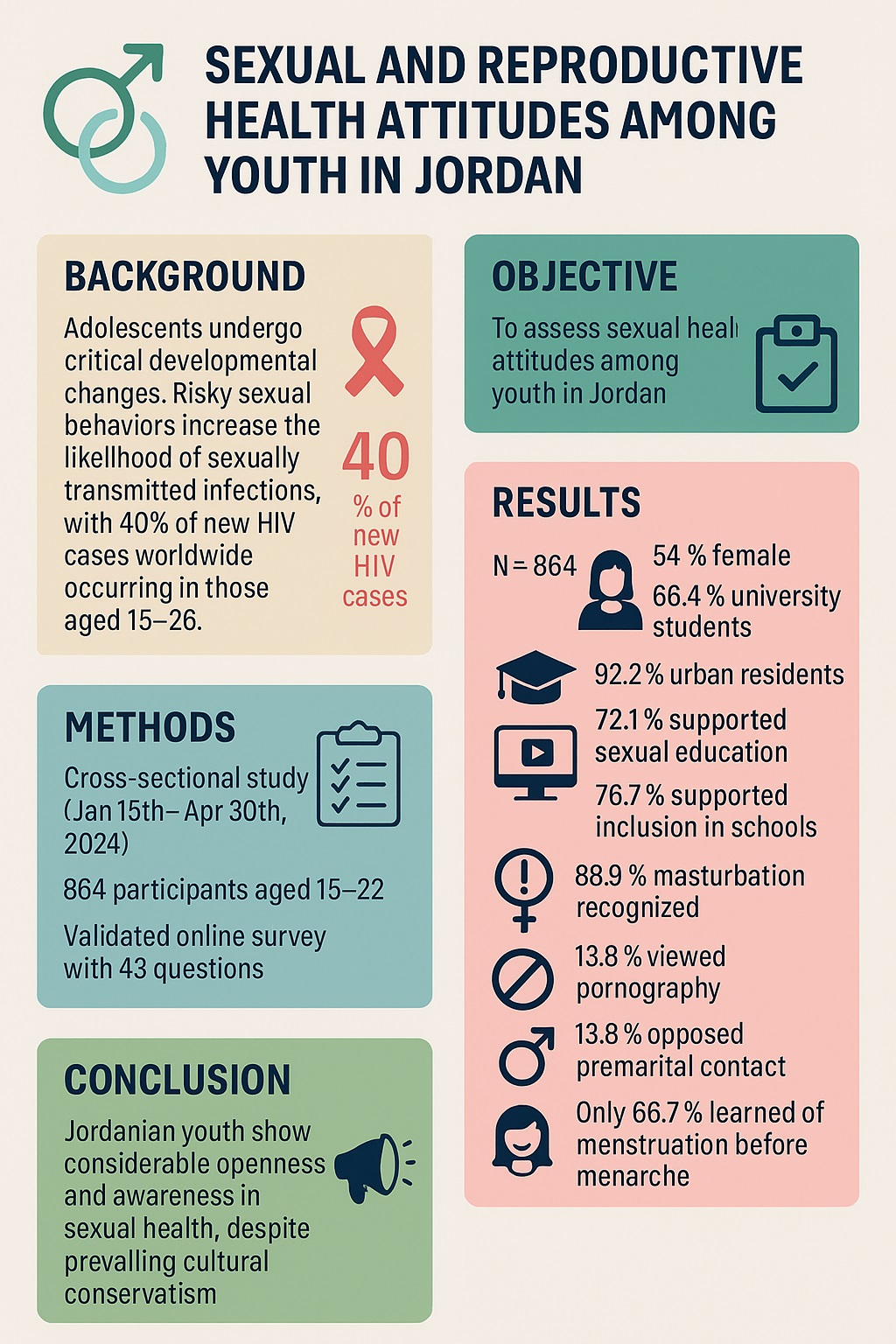Tue, Feb 24, 2026
[Archive]
Volume 23, Issue 6 (June 2025)
IJRM 2025, 23(6): 493-506 |
Back to browse issues page
Ethics code: No.20/6/2021/2022
Download citation:
BibTeX | RIS | EndNote | Medlars | ProCite | Reference Manager | RefWorks
Send citation to:



BibTeX | RIS | EndNote | Medlars | ProCite | Reference Manager | RefWorks
Send citation to:
Almahmoud L, Altawil L, Shahatit Y, Sami R, Qatawneh A A, Alkhdaire Z M, et al . Knowledge and attitudes toward sexual and reproductive health among youth in Jordan: A cross-sectional study. IJRM 2025; 23 (6) :493-506
URL: http://ijrm.ir/article-1-3476-en.html
URL: http://ijrm.ir/article-1-3476-en.html
Lina Almahmoud *1 

 , Laith Altawil2
, Laith Altawil2 

 , Yazan Shahatit2
, Yazan Shahatit2 

 , Rawan Sami3
, Rawan Sami3 

 , Ayman Abdullah Qatawneh2
, Ayman Abdullah Qatawneh2 

 , Zaid Mohannad Alkhdaire2
, Zaid Mohannad Alkhdaire2 

 , Rajai Zurikat4
, Rajai Zurikat4 

 , Akram Mohammad Karmoul5
, Akram Mohammad Karmoul5 

 , Abdallah Abuawad3
, Abdallah Abuawad3 

 , Wasan Al-Dalabeeh3
, Wasan Al-Dalabeeh3 

 , Mohammad Abu Khait6
, Mohammad Abu Khait6 

 , Morad Bani-Hani7
, Morad Bani-Hani7 




 , Laith Altawil2
, Laith Altawil2 

 , Yazan Shahatit2
, Yazan Shahatit2 

 , Rawan Sami3
, Rawan Sami3 

 , Ayman Abdullah Qatawneh2
, Ayman Abdullah Qatawneh2 

 , Zaid Mohannad Alkhdaire2
, Zaid Mohannad Alkhdaire2 

 , Rajai Zurikat4
, Rajai Zurikat4 

 , Akram Mohammad Karmoul5
, Akram Mohammad Karmoul5 

 , Abdallah Abuawad3
, Abdallah Abuawad3 

 , Wasan Al-Dalabeeh3
, Wasan Al-Dalabeeh3 

 , Mohammad Abu Khait6
, Mohammad Abu Khait6 

 , Morad Bani-Hani7
, Morad Bani-Hani7 


1- Department of Medical Doctors, Farah Medical Campus, Amman, Jordan. , linaalmahmoud@hotmail.com
2- Department of Medical Doctors, Farah Medical Campus, Amman, Jordan.
3- Faculty of Medicine, The Hashemite University, Zarqa, Jordan.
4- Department of General Medicine, Hospitalist Services, Abdali Hospital, Amman, Jordan.
5- Faculty of Medicine, Jordan University for Science and Technology, Irbid, Jordan.
6- Faculty of Medicine, Yarmouk University, Irbid, Jordan.
7- Department of General Surgery, Urology, and Anesthesia, Faculty of Medicine, The Hashemite University, Zarqa, Jordan.
2- Department of Medical Doctors, Farah Medical Campus, Amman, Jordan.
3- Faculty of Medicine, The Hashemite University, Zarqa, Jordan.
4- Department of General Medicine, Hospitalist Services, Abdali Hospital, Amman, Jordan.
5- Faculty of Medicine, Jordan University for Science and Technology, Irbid, Jordan.
6- Faculty of Medicine, Yarmouk University, Irbid, Jordan.
7- Department of General Surgery, Urology, and Anesthesia, Faculty of Medicine, The Hashemite University, Zarqa, Jordan.
Abstract: (737 Views)
Background: Adolescents constitute 16% of the world's population, among whom critical developmental changes influence their health. Risky sexual behaviors increase the likelihood of contracting sexually transmitted infections, with 40% of global new HIV cases occurring in individuals aged 15-25 yr.
Objective: This study aims to assess sexual health attitudes among youth in Jordan.
Materials and Methods: This cross-sectional study was conducted from January to April, 2024, involving 864 participants aged between 15 and 22. Data were collected through a validated online survey comprising 43 questions covering socio-demographic factors and knowledge/attitudes toward sexual education, masturbation, pornography, sexual behaviors, and menstruation.
Results: Of the participants, 54% were females, 66.4% were university students, and 92.2% resided in urban areas. Most supported sexual education (72.1%) and its inclusion in schools (76.7%). Masturbation was recognized by 88.9%, and pornography had been viewed by 69.9%, with a strong association with male gender (p < 0.001). Physical contact with partners was reported by 31.6% while 13.8% opposed it before marriage. Unwanted sexual touch was significantly more reported by females (p < 0.001). Additionally, 75.7% would seek expert help for sexual issues. Only 66.7% of females learned about menstruation before its onset.
Conclusion: Despite prevailing cultural conservatism, Jordanian youth show considerable openness and awareness regarding sexual health. These findings highlight the need for culturally sensitive, structured sexual education and open dialogue to promote adolescent reproductive well-being.
Objective: This study aims to assess sexual health attitudes among youth in Jordan.
Materials and Methods: This cross-sectional study was conducted from January to April, 2024, involving 864 participants aged between 15 and 22. Data were collected through a validated online survey comprising 43 questions covering socio-demographic factors and knowledge/attitudes toward sexual education, masturbation, pornography, sexual behaviors, and menstruation.
Results: Of the participants, 54% were females, 66.4% were university students, and 92.2% resided in urban areas. Most supported sexual education (72.1%) and its inclusion in schools (76.7%). Masturbation was recognized by 88.9%, and pornography had been viewed by 69.9%, with a strong association with male gender (p < 0.001). Physical contact with partners was reported by 31.6% while 13.8% opposed it before marriage. Unwanted sexual touch was significantly more reported by females (p < 0.001). Additionally, 75.7% would seek expert help for sexual issues. Only 66.7% of females learned about menstruation before its onset.
Conclusion: Despite prevailing cultural conservatism, Jordanian youth show considerable openness and awareness regarding sexual health. These findings highlight the need for culturally sensitive, structured sexual education and open dialogue to promote adolescent reproductive well-being.
Keywords: Sexual health, Health services, Health knowledge, Attitudes, Practice, Adolescent, Jordan.
Type of Study: Original Article |
Subject:
Reproductive Epidemiology
Send email to the article author
| Rights and permissions | |
 |
This work is licensed under a Creative Commons Attribution-NonCommercial 4.0 International License. |





